外研(新标准)版七年级上册Module 4 Healthy food Unit 3 Language in use.课件(共46张PPT)
文档属性
| 名称 | 外研(新标准)版七年级上册Module 4 Healthy food Unit 3 Language in use.课件(共46张PPT) | 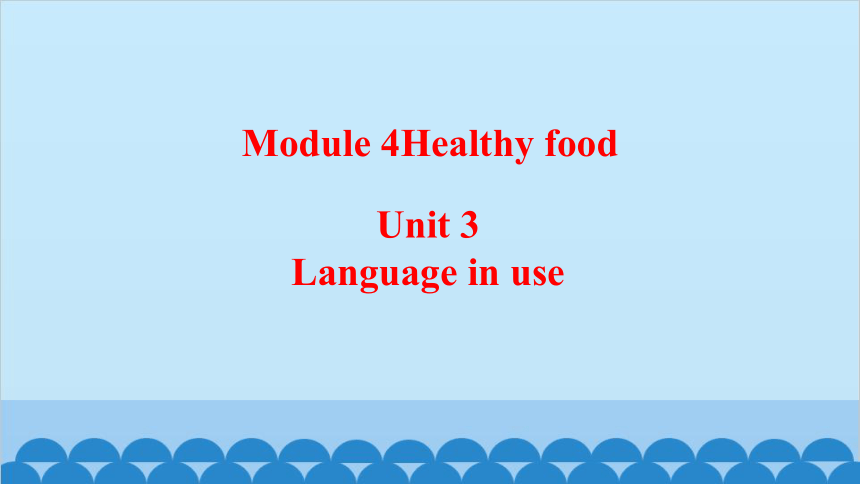 | |
| 格式 | ppt | ||
| 文件大小 | 660.0KB | ||
| 资源类型 | 教案 | ||
| 版本资源 | 外研版 | ||
| 科目 | 英语 | ||
| 更新时间 | 2022-10-19 18:22:00 | ||
图片预览


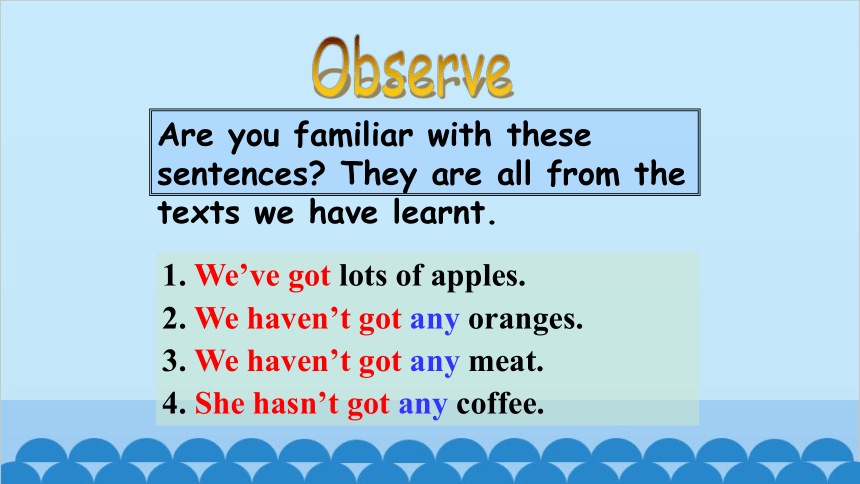
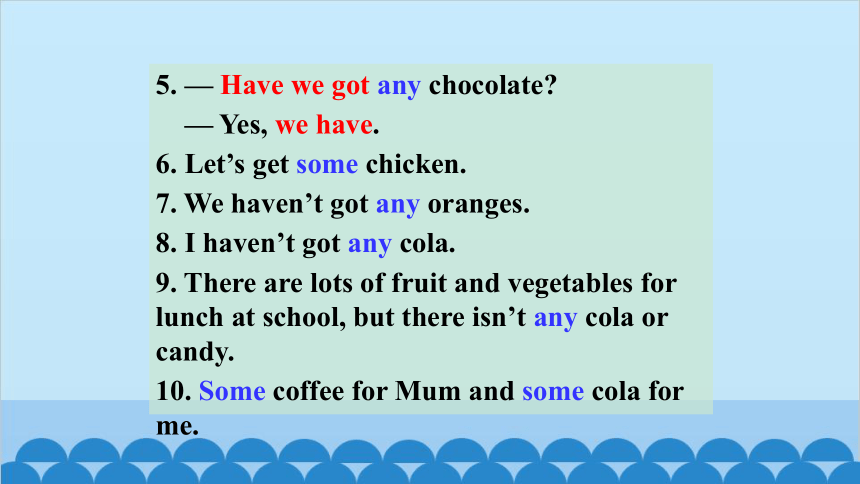
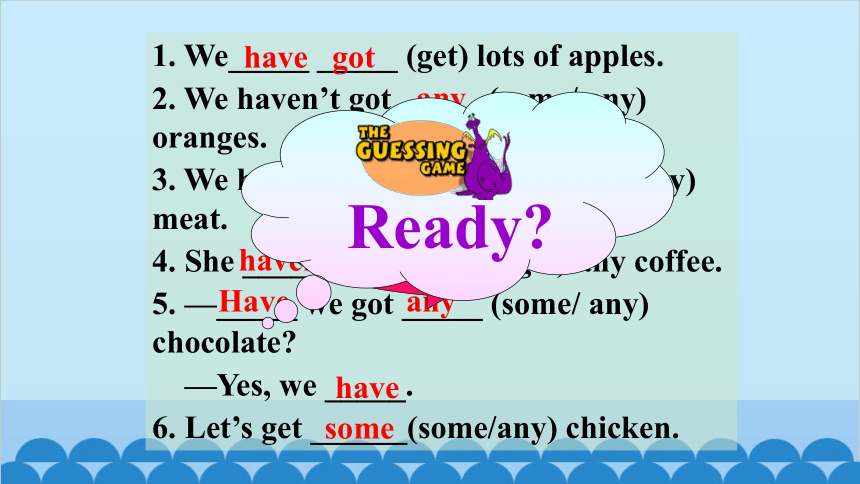
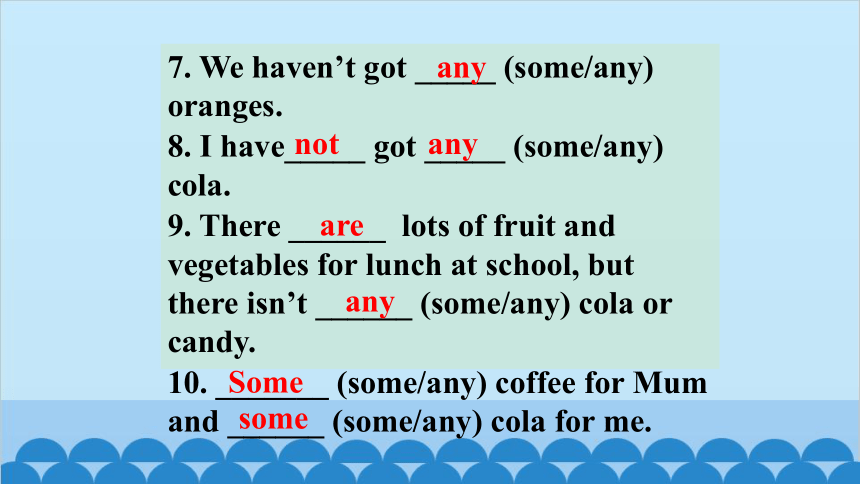

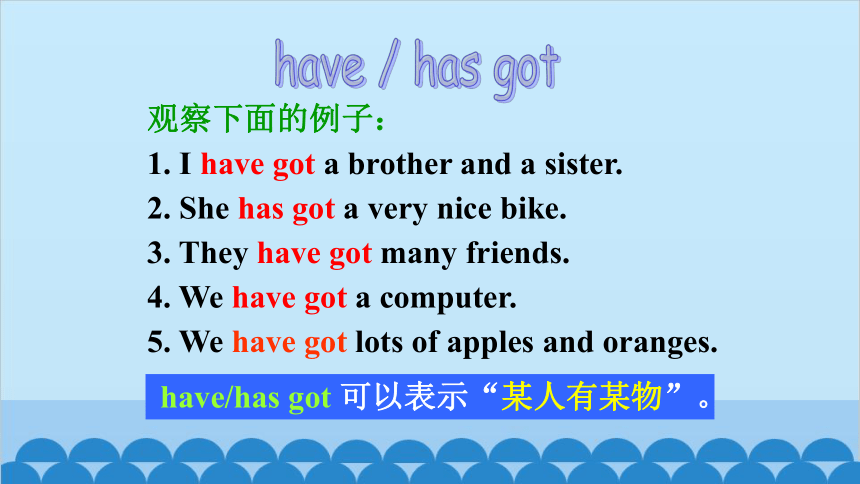
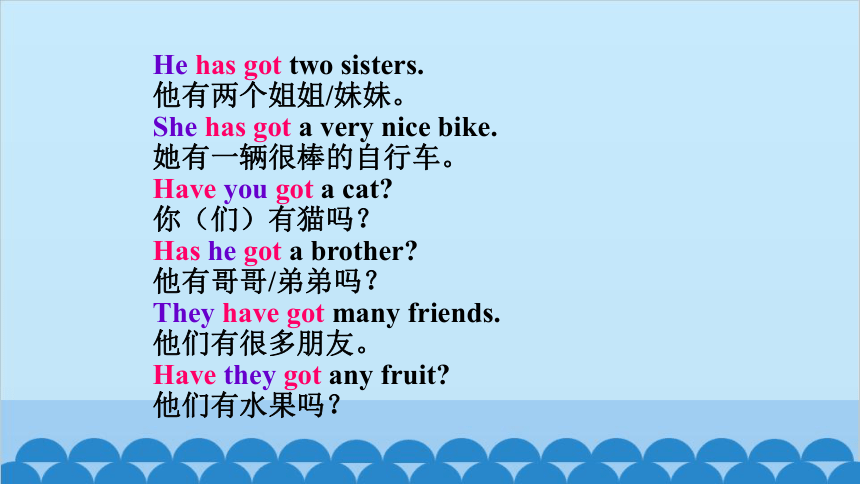

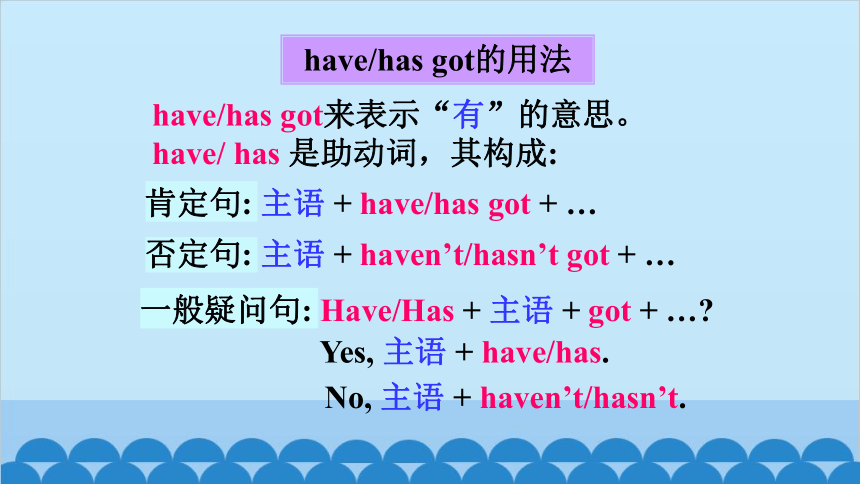

文档简介
(共46张PPT)
Unit 3
Language in use
Module 4Healthy food
Objectives:
1. To summarise and consolidate the structure have/has got
2. To summarise and consolidate the use of some and any
3. To learn to use singular and plural noun correctly
Are you familiar with these sentences They are all from the texts we have learnt.
1. We’ve got lots of apples.
2. We haven’t got any oranges.
3. We haven’t got any meat.
4. She hasn’t got any coffee.
5. — Have we got any chocolate
— Yes, we have.
6. Let’s get some chicken.
7. We haven’t got any oranges.
8. I haven’t got any cola.
9. There are lots of fruit and vegetables for lunch at school, but there isn’t any cola or candy.
10. Some coffee for Mum and some cola for me.
1. We_____ _____ (get) lots of apples.
2. We haven’t got _____ (some/ any) oranges.
3. We have_____ got _____ (some/ any) meat.
4. She ______ ______( not get) any coffee.
5. —_____ we got _____ (some/ any) chocolate
—Yes, we _____.
6. Let’s get ______(some/any) chicken.
have got
any
not
any
haven’t got
Have
any
have
some
go
Ready
7. We haven’t got _____ (some/any) oranges.
8. I have_____ got _____ (some/any) cola.
9. There ______ lots of fruit and vegetables for lunch at school, but there isn’t ______ (some/any) cola or candy.
10. _______ (some/any) coffee for Mum and ______ (some/any) cola for me.
any
not any
are
any
Some
some
have / has got
some&any
观察下面的例子:
1. I have got a brother and a sister.
2. She has got a very nice bike.
3. They have got many friends.
4. We have got a computer.
5. We have got lots of apples and oranges.
have/has got 可以表示“某人有某物”。
He has got two sisters.
他有两个姐姐/妹妹。
She has got a very nice bike.
她有一辆很棒的自行车。
Have you got a cat
你(们)有猫吗?
Has he got a brother
他有哥哥/弟弟吗?
They have got many friends.
他们有很多朋友。
Have they got any fruit
他们有水果吗?
你能总结出have/has got的变化形式吗?
肯定句: 主语 + have/has got + …
否定句: 主语 + haven’t/hasn’t got + …
have/has got的用法
Yes, 主语 + have/has.
No, 主语 + haven’t/hasn’t.
have/has got来表示“有”的意思。have/ has 是助动词,其构成:
一般疑问句: Have/Has + 主语 + got + …
注: have用于主语是第一人称(I, we),第二人称(you)以及第三人称复数(they),其他复数名词或并列的主语。has 用于第三人称单数(he, she, it或单数名词)。
在上一模块我们学习了There be句型。There be 和 have / has got 都表示“有”。
它们的区别是什么呢?
考考你
含义 关系
have/has got 某人有 所属关系
there be 某地有某人或某物 存在关系
I have got a new book.
There is a new book on the desk.
She has got a lot of friends.
There are a lot of friends in the meeting room.
我有一本新书。
桌子上有一本新书。
她有很多朋友。
会议室里有很多朋友。
1) We haven’t got any yogurt in the fridge.
我们冰箱里没有酸奶了。
2) There isn’t any yogurt in the fridge.
冰箱里没有酸奶了。
这两句尽管意思相近,但侧重点不同。第一句强调“我们没有酸奶了”,冰箱是次要的;而第二句强调“冰箱里没有酸奶了”。
1. ______ _____ any bread in the box
2. She doesn’t ____ a nice kite.
3. Under the tree _____ _____ some
women drinking tea.
4. _____ _____ any cakes in your bag
5. ________ you _______ a white shirt
Is there
have
there are
Are there
Have/Do got/have
用 there be / have (has) got / has (have) 的正确形式填空。
在there be和have got句型的肯定、否定和疑问式中,我们注意到有时用some,
而有时用any。那么some和any如何区别
使用呢?请看例子:
There is some milk in the cup.
I have got some nice monkey stamps.
We haven’t got any English classmates.
Has he got any sisters
Is there any good news today
你能总结一下some和any的用法吗?
some用于肯定句中
any 用于疑问句和否定句中
some和any既可用于可数名词的复数之前,也可用于不可数名词之前。
Could I have some more bread, please
我多拿一些面包可以吗?
Would you like some more soup
你还要点汤吗?
注意:
当说话人期待肯定回答或者有意图鼓励说话人作肯定回答时,some可用于疑问句。
1. ─ Would you like some ____
─ Thank you, but I’m not thirsty
(口渴).
A. sandwiches B. bread C. juice
2. ─ Have you got ____ milk
─ Yes, I have got ____.
A. some; some B. any; some
C. a; some
选择正确单词,完成句子。
1. Have we got any carrots
2. Yes, we’ve got some carrots.
3. Have we got any melons
4. Yes, we’ve got some melons.
5. We haven’t got any apples.
6. Apples are healthy food.
7. Noodles are healthy food.
大家先看例子:
可数名词复数形式规则变化:
条件 变化形式 例词
一般情况 加-s desk – desks
以s, x, ch, sh结尾 加-es watch - watches,
bus - buses
以“辅音字母+y”结尾 改y为i再
加es family - families,
city - cities
以“辅音字母+o”结尾 加-es /-s tomato - tomatoes,
piano - pianos
以f或fe结尾 改f或fe为v再加es life - lives,
knife - knives
child---children woman---women
man---men foot---feet
tooth---teeth
Japanese---Japanese
Chinese---Chinese
sheep---sheep
有些单词单复数同形。
有些名词的复数变化是不规则的。
1. We haven’t got any _______ (桔子).
2. Eating more __________ (蔬菜) is
good for your health.
3. How many ________ (西红柿) have
you got
4. My favourite meat is ____ (鱼肉).
根据括号内的汉语提示完成句子。
oranges
vegetables
tomatoes
fish
以下部分为课本练习,供老师在对答案时选择使用。
Work in pairs. Look at the picture and talk about the food in the fridge.
1
— Have we got any…
— Yes, we have./
No, we haven’t.
Now write about the food in the fridge.
We’ve got some meat.
We haven’t got any fish.
_______________ vegetables.
2. _________________ oranges.
3. _________________ apples.
4. _________________ eggs.
5. _________________ bananas.
6. _________________ orange juice.
7. _________________ milk.
We’ve got some
We haven’t got any
We haven’t got any
We’ve got some
We’ve got some
We’ve got some
We haven’t got any
apple hamburger orange potato tomato
apples hamburgers oranges potatoes tomatoes
fish meat rice milk juice chicken water
Look at the words in the box and pay attention to the plural nouns.
2
Look at the picture and talk about it.
He has got some /a(n)…
He hasn’t got any…
She has got some /a(n)…
She hasn’t got any…
They have got some /a(n)…
They haven’t got any…
He has got some chicken/ fish/ meat/ rice/ potatoes/ water.
He hasn’t got any juice/ oranges/ apples/ milk/ hamburgers.
She has got some juice/ oranges/ apples/ milk/ a hamburger.
She hasn’t got any potatoes/ chicken/ fish/ meat/ rice/ noodles.
They have got some food and drinks.
They haven’t got any noodles.
Possible answers:
Complete the word map.
food
vegetables
favourite food
healthy food
meat
fruit
chocolate
ice cream
apple
orange
banana
beans
carrot
potato
pork
beef
chicken
3
drink
healthy drink
favourite drink
juice
milk
water
tea
cola
4
Complete the sentences with the correct form of the words from the box.
bit delicious important remember stay
1. _________ to buy some fruit.
2. It’s _________ to eat healthy food.
3. Eat well and _______ healthy.
4. Orange juice is ________. Let’s buy some.
5. I am a _______ tired.
Remember
important
stay
delicious
bit
Making a poster about a healthy breakfast.
Ⅰ. Work in groups of four or five. Make a poster about a healthy breakfast.
Make a list of questions about a healthy breakfast.
Talk to students from another group about a healthy breakfast.
Make a poster about your healthy breakfast.
Ⅱ. Present your poster to the class.
Ⅲ. Choose the best poster.
1. has/ have got表示“某人有某物”
肯定句: 主语 + have/has got + …
否定句: 主语 + haven’t/hasn’t got + …
Yes, 主语 + have/has.
No, 主语 + haven’t/hasn’t.
一般疑问句: Have/Has + 主语 + got + …
2. some和any的用法
3. 可数名词的复数变化
规则变化
不规则变化
单复数同形
some用于肯定句中
any 用于疑问句和否定句中
some和any既可用于可数名词的复数之前,也可用于不可数名词之前。
Ⅰ. 根据提示写出正确的单词。
1. What do you have for l_________ (午饭), Jenny
2. There are many yellow b_________ (香蕉) on the table.
3. It’s five o’clock. Let’s go h_________ (家) now.
4. They have d_________ (晚饭) at 7:00 in the evening
5. Lily, what do you want to b_________
(买) for your mother
unch
ananas
ome
inner
uy
Practice
Ⅱ. 用have 的正确形式完成句子。
1. Peter _________ got a pen and two pencils.
2. Tian Hong _________ got some nice hats.
3. _________ they got any orange juice
4. We _________ got many apples and pears.
5. —_________ Lingling got one uncle
—Yes, she _________.
has
has
Have
have
Has
has
Ⅲ. 用所给单词的正确形式填空。
1. There are lots of big _________ (city) in China.
2. There are two _________ (child) in front of the house.
3. Tony _________ (have not) got a new desk.
4. There are some _________ (tomato) and meat in the kitchen (厨房).
5. There are two big school _________ (bus) in our school.
cities
children
hasn’t
tomatoes
buses
Ⅳ. 根据对话内容,用适当的句子补全对话。
A: Good afternoon, Rose.
B: Good afternoon, Kate.
A: (1) ____________________________
B: No, I haven’t. Cola is bad for us. I don’t like it.
A: (2) ____________________________
B: Milk is my favourite. (3) __________
Have you got any cola
What’s your favourite drink
How about you
A: I like cola and tea.
B: (4) ____________________________
Don’t drink too much!
A: OK. Thank you.
B: (5) ____________________________
They are not good for you.
You’re welcome.
1. Review the grammar we have learned today.
2. Finish the exercises in Learning English.
Homework
Unit 3
Language in use
Module 4Healthy food
Objectives:
1. To summarise and consolidate the structure have/has got
2. To summarise and consolidate the use of some and any
3. To learn to use singular and plural noun correctly
Are you familiar with these sentences They are all from the texts we have learnt.
1. We’ve got lots of apples.
2. We haven’t got any oranges.
3. We haven’t got any meat.
4. She hasn’t got any coffee.
5. — Have we got any chocolate
— Yes, we have.
6. Let’s get some chicken.
7. We haven’t got any oranges.
8. I haven’t got any cola.
9. There are lots of fruit and vegetables for lunch at school, but there isn’t any cola or candy.
10. Some coffee for Mum and some cola for me.
1. We_____ _____ (get) lots of apples.
2. We haven’t got _____ (some/ any) oranges.
3. We have_____ got _____ (some/ any) meat.
4. She ______ ______( not get) any coffee.
5. —_____ we got _____ (some/ any) chocolate
—Yes, we _____.
6. Let’s get ______(some/any) chicken.
have got
any
not
any
haven’t got
Have
any
have
some
go
Ready
7. We haven’t got _____ (some/any) oranges.
8. I have_____ got _____ (some/any) cola.
9. There ______ lots of fruit and vegetables for lunch at school, but there isn’t ______ (some/any) cola or candy.
10. _______ (some/any) coffee for Mum and ______ (some/any) cola for me.
any
not any
are
any
Some
some
have / has got
some&any
观察下面的例子:
1. I have got a brother and a sister.
2. She has got a very nice bike.
3. They have got many friends.
4. We have got a computer.
5. We have got lots of apples and oranges.
have/has got 可以表示“某人有某物”。
He has got two sisters.
他有两个姐姐/妹妹。
She has got a very nice bike.
她有一辆很棒的自行车。
Have you got a cat
你(们)有猫吗?
Has he got a brother
他有哥哥/弟弟吗?
They have got many friends.
他们有很多朋友。
Have they got any fruit
他们有水果吗?
你能总结出have/has got的变化形式吗?
肯定句: 主语 + have/has got + …
否定句: 主语 + haven’t/hasn’t got + …
have/has got的用法
Yes, 主语 + have/has.
No, 主语 + haven’t/hasn’t.
have/has got来表示“有”的意思。have/ has 是助动词,其构成:
一般疑问句: Have/Has + 主语 + got + …
注: have用于主语是第一人称(I, we),第二人称(you)以及第三人称复数(they),其他复数名词或并列的主语。has 用于第三人称单数(he, she, it或单数名词)。
在上一模块我们学习了There be句型。There be 和 have / has got 都表示“有”。
它们的区别是什么呢?
考考你
含义 关系
have/has got 某人有 所属关系
there be 某地有某人或某物 存在关系
I have got a new book.
There is a new book on the desk.
She has got a lot of friends.
There are a lot of friends in the meeting room.
我有一本新书。
桌子上有一本新书。
她有很多朋友。
会议室里有很多朋友。
1) We haven’t got any yogurt in the fridge.
我们冰箱里没有酸奶了。
2) There isn’t any yogurt in the fridge.
冰箱里没有酸奶了。
这两句尽管意思相近,但侧重点不同。第一句强调“我们没有酸奶了”,冰箱是次要的;而第二句强调“冰箱里没有酸奶了”。
1. ______ _____ any bread in the box
2. She doesn’t ____ a nice kite.
3. Under the tree _____ _____ some
women drinking tea.
4. _____ _____ any cakes in your bag
5. ________ you _______ a white shirt
Is there
have
there are
Are there
Have/Do got/have
用 there be / have (has) got / has (have) 的正确形式填空。
在there be和have got句型的肯定、否定和疑问式中,我们注意到有时用some,
而有时用any。那么some和any如何区别
使用呢?请看例子:
There is some milk in the cup.
I have got some nice monkey stamps.
We haven’t got any English classmates.
Has he got any sisters
Is there any good news today
你能总结一下some和any的用法吗?
some用于肯定句中
any 用于疑问句和否定句中
some和any既可用于可数名词的复数之前,也可用于不可数名词之前。
Could I have some more bread, please
我多拿一些面包可以吗?
Would you like some more soup
你还要点汤吗?
注意:
当说话人期待肯定回答或者有意图鼓励说话人作肯定回答时,some可用于疑问句。
1. ─ Would you like some ____
─ Thank you, but I’m not thirsty
(口渴).
A. sandwiches B. bread C. juice
2. ─ Have you got ____ milk
─ Yes, I have got ____.
A. some; some B. any; some
C. a; some
选择正确单词,完成句子。
1. Have we got any carrots
2. Yes, we’ve got some carrots.
3. Have we got any melons
4. Yes, we’ve got some melons.
5. We haven’t got any apples.
6. Apples are healthy food.
7. Noodles are healthy food.
大家先看例子:
可数名词复数形式规则变化:
条件 变化形式 例词
一般情况 加-s desk – desks
以s, x, ch, sh结尾 加-es watch - watches,
bus - buses
以“辅音字母+y”结尾 改y为i再
加es family - families,
city - cities
以“辅音字母+o”结尾 加-es /-s tomato - tomatoes,
piano - pianos
以f或fe结尾 改f或fe为v再加es life - lives,
knife - knives
child---children woman---women
man---men foot---feet
tooth---teeth
Japanese---Japanese
Chinese---Chinese
sheep---sheep
有些单词单复数同形。
有些名词的复数变化是不规则的。
1. We haven’t got any _______ (桔子).
2. Eating more __________ (蔬菜) is
good for your health.
3. How many ________ (西红柿) have
you got
4. My favourite meat is ____ (鱼肉).
根据括号内的汉语提示完成句子。
oranges
vegetables
tomatoes
fish
以下部分为课本练习,供老师在对答案时选择使用。
Work in pairs. Look at the picture and talk about the food in the fridge.
1
— Have we got any…
— Yes, we have./
No, we haven’t.
Now write about the food in the fridge.
We’ve got some meat.
We haven’t got any fish.
_______________ vegetables.
2. _________________ oranges.
3. _________________ apples.
4. _________________ eggs.
5. _________________ bananas.
6. _________________ orange juice.
7. _________________ milk.
We’ve got some
We haven’t got any
We haven’t got any
We’ve got some
We’ve got some
We’ve got some
We haven’t got any
apple hamburger orange potato tomato
apples hamburgers oranges potatoes tomatoes
fish meat rice milk juice chicken water
Look at the words in the box and pay attention to the plural nouns.
2
Look at the picture and talk about it.
He has got some /a(n)…
He hasn’t got any…
She has got some /a(n)…
She hasn’t got any…
They have got some /a(n)…
They haven’t got any…
He has got some chicken/ fish/ meat/ rice/ potatoes/ water.
He hasn’t got any juice/ oranges/ apples/ milk/ hamburgers.
She has got some juice/ oranges/ apples/ milk/ a hamburger.
She hasn’t got any potatoes/ chicken/ fish/ meat/ rice/ noodles.
They have got some food and drinks.
They haven’t got any noodles.
Possible answers:
Complete the word map.
food
vegetables
favourite food
healthy food
meat
fruit
chocolate
ice cream
apple
orange
banana
beans
carrot
potato
pork
beef
chicken
3
drink
healthy drink
favourite drink
juice
milk
water
tea
cola
4
Complete the sentences with the correct form of the words from the box.
bit delicious important remember stay
1. _________ to buy some fruit.
2. It’s _________ to eat healthy food.
3. Eat well and _______ healthy.
4. Orange juice is ________. Let’s buy some.
5. I am a _______ tired.
Remember
important
stay
delicious
bit
Making a poster about a healthy breakfast.
Ⅰ. Work in groups of four or five. Make a poster about a healthy breakfast.
Make a list of questions about a healthy breakfast.
Talk to students from another group about a healthy breakfast.
Make a poster about your healthy breakfast.
Ⅱ. Present your poster to the class.
Ⅲ. Choose the best poster.
1. has/ have got表示“某人有某物”
肯定句: 主语 + have/has got + …
否定句: 主语 + haven’t/hasn’t got + …
Yes, 主语 + have/has.
No, 主语 + haven’t/hasn’t.
一般疑问句: Have/Has + 主语 + got + …
2. some和any的用法
3. 可数名词的复数变化
规则变化
不规则变化
单复数同形
some用于肯定句中
any 用于疑问句和否定句中
some和any既可用于可数名词的复数之前,也可用于不可数名词之前。
Ⅰ. 根据提示写出正确的单词。
1. What do you have for l_________ (午饭), Jenny
2. There are many yellow b_________ (香蕉) on the table.
3. It’s five o’clock. Let’s go h_________ (家) now.
4. They have d_________ (晚饭) at 7:00 in the evening
5. Lily, what do you want to b_________
(买) for your mother
unch
ananas
ome
inner
uy
Practice
Ⅱ. 用have 的正确形式完成句子。
1. Peter _________ got a pen and two pencils.
2. Tian Hong _________ got some nice hats.
3. _________ they got any orange juice
4. We _________ got many apples and pears.
5. —_________ Lingling got one uncle
—Yes, she _________.
has
has
Have
have
Has
has
Ⅲ. 用所给单词的正确形式填空。
1. There are lots of big _________ (city) in China.
2. There are two _________ (child) in front of the house.
3. Tony _________ (have not) got a new desk.
4. There are some _________ (tomato) and meat in the kitchen (厨房).
5. There are two big school _________ (bus) in our school.
cities
children
hasn’t
tomatoes
buses
Ⅳ. 根据对话内容,用适当的句子补全对话。
A: Good afternoon, Rose.
B: Good afternoon, Kate.
A: (1) ____________________________
B: No, I haven’t. Cola is bad for us. I don’t like it.
A: (2) ____________________________
B: Milk is my favourite. (3) __________
Have you got any cola
What’s your favourite drink
How about you
A: I like cola and tea.
B: (4) ____________________________
Don’t drink too much!
A: OK. Thank you.
B: (5) ____________________________
They are not good for you.
You’re welcome.
1. Review the grammar we have learned today.
2. Finish the exercises in Learning English.
Homework
同课章节目录
- Starte
- Module 1 My teacher and my friends
- Module 2 My English lesson
- Module 3 My English book
- Module 4 My everyday life
- Module 1 My classmates
- Unit 1 Nice to meet you.
- Unit 2 I'm Wang Lingling and I'm thirteen years ol
- Unit 3 Language in use.
- Module 2 My family
- Unit 1 Is this your mum?
- Unit 2 These are my parents.
- Unit 3 Language in use.
- Module 3 My school
- Unit 1 There are thirty students in my class.
- Unit 2 The library is on the left of the playgroun
- Unit 3 Language in use.
- Module 4 Healthy food
- Unit 1 We've got lots of apples.
- Unit 2 Is your food and drink healthy?
- Unit 3 Language in use.
- Module 5 My school day
- Unit 1 I love history.
- Unit 2 We start work at nine o'clock.
- Unit 3 Language in use.
- Revision module A
- Module 6 A trip to the zoo
- Unit 1 Does it eat meat?
- Unit 2 The tiger lives in Asia.
- Unit 3 Language in use.
- Module 7 Computers
- Unit 1 How do I write my homework on the computer?
- Unit 2 When do you use a computer?
- Unit 3 Language in use.
- Module 8 Choosing presents
- Unit 1 I always like birthday parties.
- Unit 2 She often goes to concerts.
- Unit 3 Language in use.
- Module 9 People and places
- Unit 1 We're enjoying the school trip a lot.
- Unit 2 They're waiting for buses or trains.
- Unit 3 Language in use.
- Module 10 Spring Festival
- Unit 1 Are you getting ready for Spring Festival?
- Unit 2 My mother's cleaning our houses and sweepin
- Unit 3 Language in use.
- Revision module B
